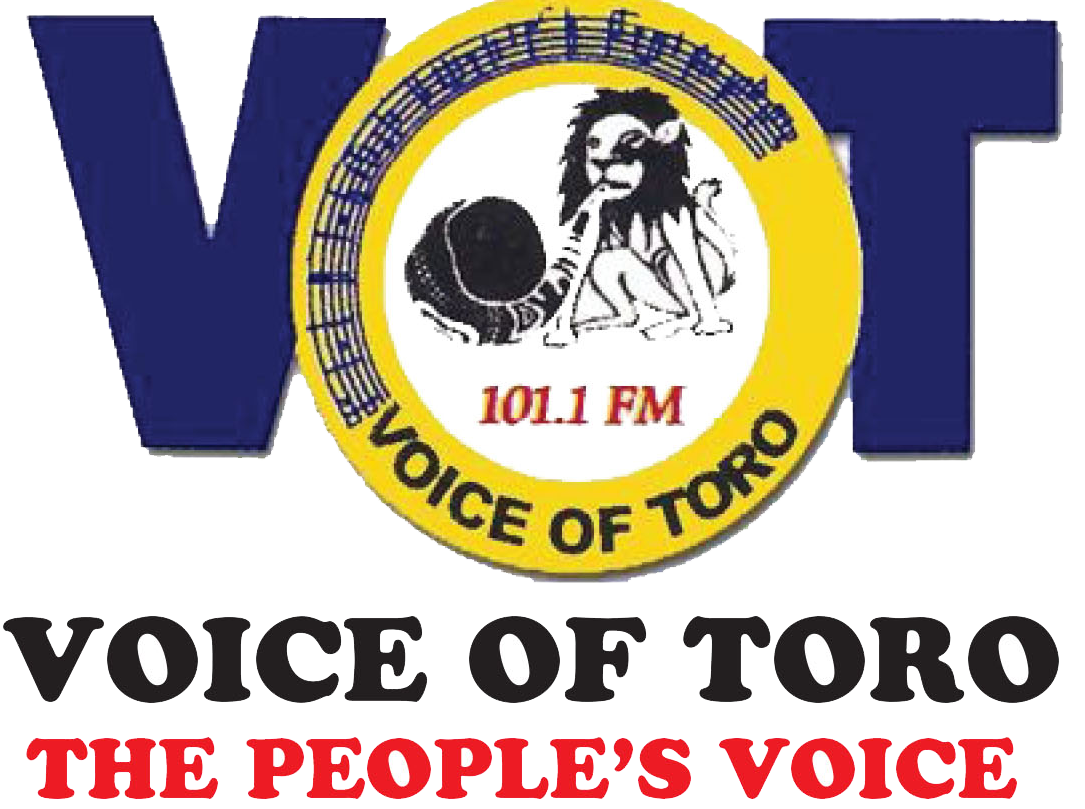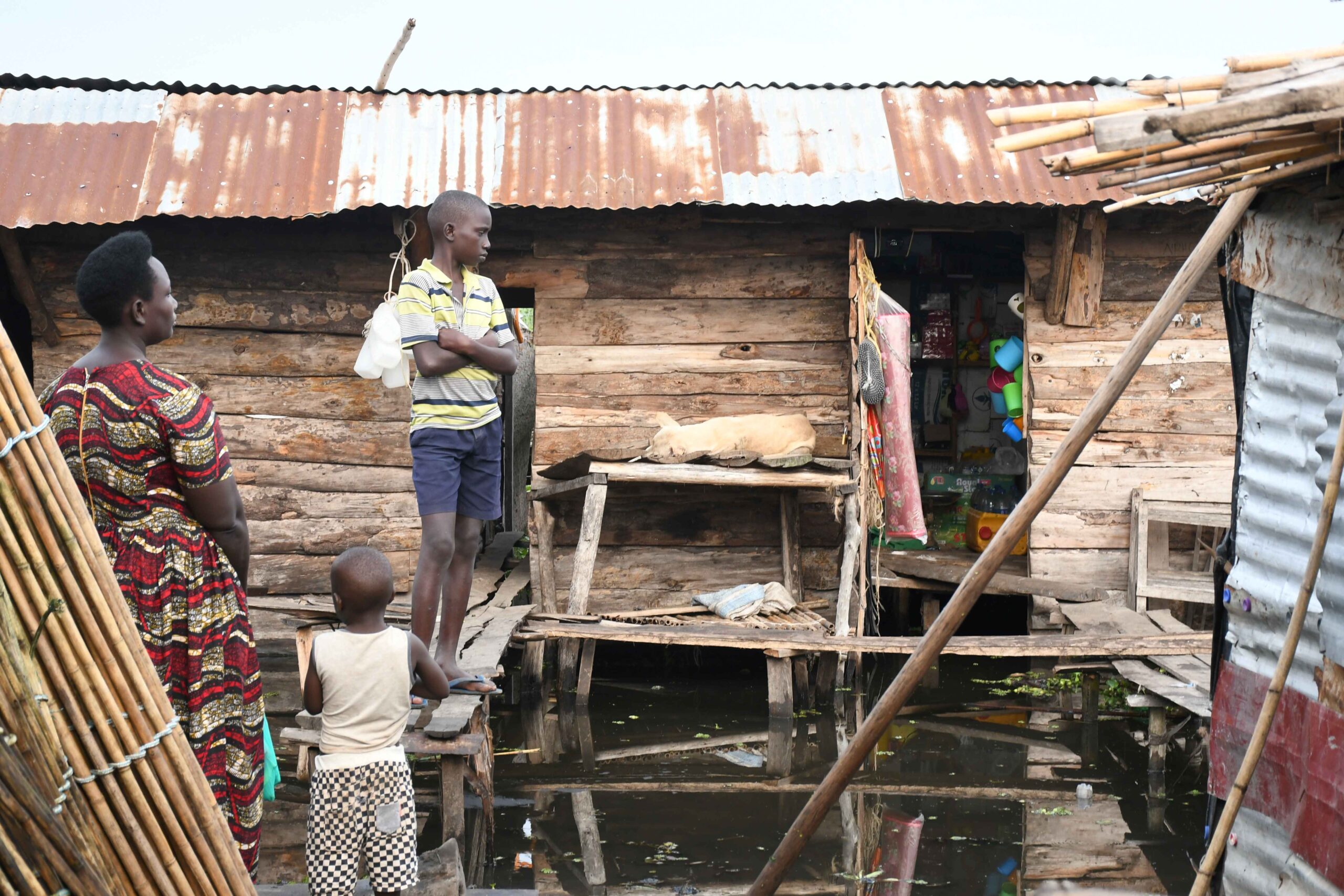
Lake Albert Floods leave women in despair four years on
By: Betty Mujungu
NTOROKO: In October 2019, the calm lives of thousands of people in the Kanara sub-county, Ntoroko district, Western Uganda, were thrown into disarray as Lake Albert’s relentless floods submerged 60 percent of the region. Four years later, despite some reduction in flood levels, thousands remain submerged, with women bearing the brunt of this disaster.
For women in these submerged villages, such as Kamuga, Kataga, Katoligo, Kachwakum and Rwangara the floods did not just rob them of their homes, livelihoods, and peace but also plunged them into a protracted struggle for survival in makeshift camps.
The displaced families have settled in seven temporary camps Katanga, Bududda, Butorwa, Katunguru, Rwakitura, Kanara Seed SS, and Rwangara Primary School where basic services are scarce, and the quality of life is deteriorating.
One of the most pressing challenges that women face is access to healthcare. Cut off from health centers, pregnant women, mothers, and children are left to fend for themselves with minimal medical assistance.
Ms. Juliana Kemigisa says the floods have demolished their homes, including schools, and children who now trek to school through water. Even at school, the toilets are in poor condition, and in the camps where they are staying, they don’t have a single toilet to use. She explains that their request to the government is to buy them land so they can relocate and build permanent houses.
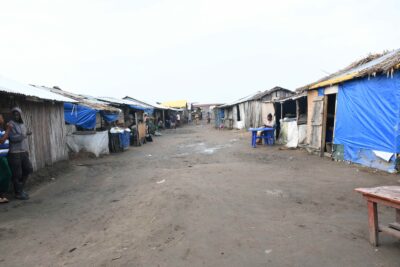
Katanga B camp for the people who were displaced by floods in Kanara sub county Ntoroko.
Inside the camps, illnesses spread easily due to poor sanitation, limited access to clean water, and lack of basic health services. As a result, women suffer the most from illnesses linked to poor sanitation, like cholera and typhoid.
According to Kataga Village Health Team members in an interview on Friday last week for August to October 2024, out of 34 people she referred to Rwangara Health Center III for treatment, 25 people were diagnosed with typhoid of which 18 them were women [15-49] years also 3 women had malaria.
“To see that someone has been referred to a health center it means the situation is worse and cannot be handled by the local clinics or drugshops, because of the nature people live in here, sometimes as VHTs, we get reports of people who want to be referred,”
Livelihoods at risk
Ms. Ruth Asiimwe, another affected resident, says that women are suffering with their children as they have been living in makeshift houses for years. She explains that all the piped water previously extended to their area has been blocked, forcing them to rely on flood waters for their water supply. She also highlights that cases of children suffering from malaria are on the rise because most families lack mosquito nets.
Alex Mugisa, a medical officer at Rwangara Health Centre III said. “In the past three months alone, we have registered over 50 cases of dysentery among children under five years.
He said the absence of piped water forces many residents to fetch water from open, stagnant flood pools or contaminated sources, especially flood waters. These water sources are breeding grounds for bacteria, parasites, and other pathogens. Additionally, limited sanitation facilities in displaced communities compound the problem, as open defecation further pollutes the available water.
“We urgently need piped water systems and water treatment facilities to protect residents from preventable diseases. Public health education campaigns about hygiene practices are equally critical,” he adds.
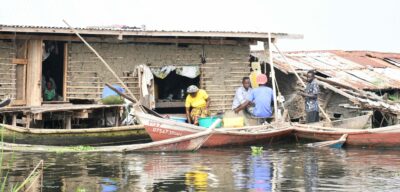 People doing their daily work in their homes in Kanara sub county, Ntoroko district (1)
People doing their daily work in their homes in Kanara sub county, Ntoroko district (1)
The District Disaster Management Committee’s report dated 3rd September 2024 shows that a total of 30,224 people from 6,980 households have been affected by the floods. Of these, 13,137 are males, 16,041 are females, 14,183 are children, and 874 are people with disabilities.
Out of 30,224 total affected people, 24,858 people from 5,569 households have been internally displaced, including 9,365 people from Kanara sub-county.
The absence of clean water has forced residents to rely on contaminated lake water for their daily needs, including drinking and cooking. Many families now use the very water they depend on for sanitation, heightening the risk of waterborne diseases.
Mr. Pendson Mukasa, the Community Development Officer, says that because of the floods and people fleeing to the camps, there has been an increase in cases of domestic violence, child abuse, and prostitution within the camps. He notes that as leaders, they have conducted extensive sensitization efforts in the camps to address these issues and encourage peaceful living among the residents.
He said they register about 10-15 cases monthly from a single camp which was not common in the past before the flooding when people were staying in their respective village where about 5 cases domestic violence would be reported.
Local market collapse
Some structures, including homes and government installations, are now precariously close to the edge of the lake and may soon collapse or be swallowed by the water. Structures at risk include the fish market, a security surveillance camera, Ntoroko Customs Port, and the Kanara Town Council headquarters.
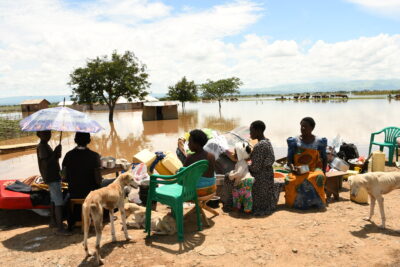 Some of the displaced women in Bweramule sub county by in Ntoroko district October 2024
Some of the displaced women in Bweramule sub county by in Ntoroko district October 2024
For women, the market is an important livelihood location where they sell their wares. The Ntoroko district chairman, Mr. William Kasoro noted that, the shorelines are now collapsing and in a few months, they were about 50 meters away but now they have come closer to people’s homes and businesses.
Local leaders want the Ministry of Water and Environment to reinforce the shoreline by constructing gabions that prevent further shorelines from collapsing.
Since 2021, the government through Prime Minister Ms. Robinah Nabbanja promised that the government will buy land for the displaced, but to date, it remains an unfulfilled dream and this has continued to force many of the displaced families to live on rented land, where they feel their future is uncertain.
Education in Crisis
The education of children, particularly girls, has been severely disrupted. Schools like Umoja and Rwangara are submerged, forcing pupils to relocate to Rwenyana IDP camp.
Nome Kasiime is a pupil at Rwangara Primary School in primary seven, located in Katanga B village, Kanara sub-county, Ntoroko district. Alongside five other children, they to go to school using a boat which she drives daily from 6.30 am from home and reach at school towards 9 am. Often they end up missing the beginning of morning lessons. As they navigate the flooded waters, which now resemble a lake, they face strong winds from Lake Albert and struggle to find clear passages due to water weeds.
“I start preparing myself at 6 am, and by 6:30 am I am ready to go to school. For me and five other pupils, we must use the boat to get to school. I am the driver because the rest are still young and cannot navigate the boat. I am the reason they continue studying,” Kasiime explains.
Sometimes they miss school, especially when the winds are too strong, as they fear the boat might capsize. Since the term started, she said they have missed several classes due to arriving late. Kasiime appeals to well-wishers to donate an engine boat and life jackets to help them reach school on time.
Mr. Kasoro attributed the ongoing operation of Umoja Primary School to tents provided by UNICEF in 2022. The World Food Program also recently extended a total of Shs 1.7 billion and 200 metric tons of rice to 3,464 houses in Ntoroko district.
Help ashore
But the locals are still hoping the government will secure disaster funds for purchasing land to resettle all internally displaced people.
Without land, women have been excluded from government programs like the Parish Development Model (PDM), which could have supported them in rebuilding their lives.
